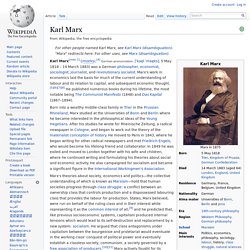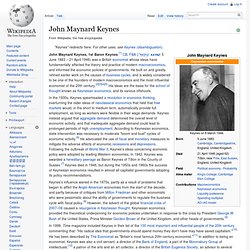

Karl Marx. Karl Marx[note 1] (/mɑrks/;[4] German pronunciation: [ˈkaɐ̯l ˈmaɐ̯ks]; 5 May 1818 – 14 March 1883) was a German philosopher, economist, sociologist, journalist, and revolutionary socialist.

Marx's work in economics laid the basis for much of the current understanding of labour and its relation to capital, and subsequent economic thought.[5][6][7][8] He published numerous books during his lifetime, the most notable being The Communist Manifesto (1848) and Das Kapital (1867–1894). Born into a wealthy middle-class family in Trier in the Prussian Rhineland, Marx studied at the Universities of Bonn and Berlin where he became interested in the philosophical ideas of the Young Hegelians. After his studies he wrote for Rheinische Zeitung, a radical newspaper in Cologne, and began to work out the theory of the materialist conception of history. John Maynard Keynes.
John Maynard Keynes, 1st Baron Keynes,[1] CB, FBA (/ˈkeɪnz/ KAYNZ; 5 June 1883 – 21 April 1946) was a British economist whose ideas have fundamentally affected the theory and practice of modern macroeconomics, and informed the economic policies of governments.

He built on and greatly refined earlier work on the causes of business cycles, and is widely considered to be one of the founders of modern macroeconomics and the most influential economist of the 20th century.[2][3][4][5] His ideas are the basis for the school of thought known as Keynesian economics, and its various offshoots. In 1999, Time magazine included Keynes in their list of the 100 most important and influential people of the 20th century, commenting that: "His radical idea that governments should spend money they don't have may have saved capitalism.
"[10] He has been described by The Economist as "Britain's most famous 20th-century economist.
Austrian School.